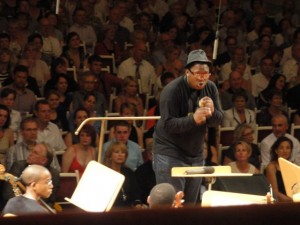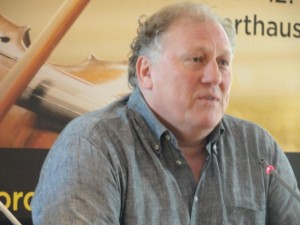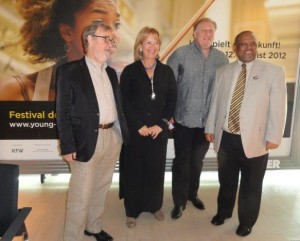
The young South African music group MIAGI (Music Is A Great Investment) has stormed the hearts of music lovers of Berlin. They opened this year’s festival (27 July – 12 August 2012) with a bang. Their two appearances kept the audience spellbound. There was never a dull moment.
The first night was a mixture of Czech romantic and French impressionism together with 20th century Americanism with the interpretation of works of Antonín Dvorák, Claude Debussy, George Gershwin, Lionel Bernstein and Christian Muthspiels’ “Out of South Africa” with its very distinctive South African sounds.
The following night, the young musicians almost brought down the roof of the Konzerthaus in Berlin. Performing under the title Young Euro Classic featuring African Jazz an impromptu ‘concoction’ of South African and German youngsters presented a completely different sound to the previous night. Although these young musicians from the two countries met each other for the first time a few days earlier, the rendition they presented under the ‘baton’ of Tshepo Tsotetsi, kept the audience on the hop. The musicians were not strangers anymore. They just simply blended into each other. A fantastic combination of classics and jazz, pop and folk, mbaganga and kwela.
Mbaganga is a popular music style, combining Zulu traditions with modern soul, jazz or reggae elements which emerged in the early 1960s in Soweto. It is very popular at dances and other happy occasions. Kwela is the Zulu word for jump in. It is a music style that made its appearance in the South African Townships around the 1950s and took its inspiration from Lester Young, Count Basie and other musicians of the swing era which also saw the birth of the penny whistle.
On both nights, the scene outside the music hall was simply out of the world. The crowd waited and demanded more and the musicians were not found wanting. They stood on the steps of the music hall and entertained the guests with typical South African folk music. I have never experienced anything like this. Normally, after the show, there is big rush to find ones way home. This was something different and very exciting.

What is MIAGI? It was founded by Robert Brooks,. who was born in the Northern town of Dundee, in KwaZulu Natal – South Africa. In 1979, he accepted an invitation to attend a summer course in Austria which he hoped to help establish him as a professional singer. The trip that was supposed to last two weeks, stretched out to 20 years before he eventually returned to the land of his birth.
Those 20 years shaped Robert into a versatile and distinguished singer. After the new dispensation in South Africa following the fair and free elections in 1994 and the establishment of a democratic parliament, Robert realised there is huge task facing him at home. He interrupted his singing career and went back home and set up MIAGI (original name – International Classic Music Festival – ICMF). It is a non-profit company established in 2001 with the support of the Department of Arts and Culture.
According to Robert Brooks: “Arts and cultural activities act as a catalyst for community revitalisation and regeneration efforts can make a difference to health, crime and employment in communities where the needs are greatest. Music also has an incredible and miraculous power”.
He explains: “What is especially compelling is a combination of groundbreaking behavioural studies and neurological research shows how music study, especially if begun in early childhood is far superior to computer instruction in dramatically enhancing children’s abstract reasoning skills, the skills for learning maths and science. And music goes even further, far beyond that, the Greek mathematician and philosopher Pythagoras, as far as we can possibly know in modern times (he studied in Egypt and died 500 BCE), used music in highly methodical way. He used certain music to heal certain psychological and physical disturbances and diseases. He knew exactly ‘what music to prescribe when’, and was apparently an amazing successful healer. Pythagoras is also nothing less than the ‘father’ of modern mathematics, and his theorem for music scales, harmonies and intervals are still the root of Western music”.

The main objective through MIAGI’s ongoing programmes is to make music education available to an increasing number of youth in South Africa especially in the rural and disadvantages areas. The programme focuses not only on classical form of instruction but also incorporates jazz and indigenous music which then offers a key to positive social development and to deep understanding between people across all borders. It addresses the issues of ethnic relations through its all-inclusive programming. Through its platform for inter-cultural creative dialogues it brings young people, artists, and audiences together that would otherwise never meet.
The MIAGI Mentor & Protégé Programme supports young exceptionally talented aspiring artists by supporting and developing semi-professional formations representing a variety of genres. In the past 12 years activities have included offering instruments, performance and study opportunities in South Africa and abroad, international tours as well as participation opportunities in major international competitions.
The MIAGI Youth Orchestra grew out of the need for a formation for youth studying within the many developmental music education initiatives that MIAGI has partnered with and supported since 2001. The members are guided by some of the very best tutors and conductors, and come from all ethnic and social backgrounds. There is no cost to individual participants. In order to secure tuition of highest artistic quality MIAGI has established a partnership with recently retired, but fully active key members of the Vienna Philharmonic Orchestra.

The person who won the hearts of the music fans is without doubt Tshepo Tsotetsi. He is not only a great conductor (and “clown”) but also a musical genius. Tshepo was born in Benoni near Johannesburg and had his first musical encounter in a trombone choir in the Township of Katlehong. As a result of his great passion for music, this multi-talented young man was accepted at the National School of Arts in Johannesburg.
Here, he founded the ensemble “Oracles of Variety” in order to try out and perform his own compositions. This was followed by the founding of the New Skool Orchestra @MIAGI in 2010 which brings together creative musicians from the MIAGI Youth Orchestra. As a soloist, Tshepo has performed with the Johannesburg Philharmonic Orchestra and the University of Pretoria Symphony Orchestra, interpreting his own composition Flowers and Rainbow.
The Young Euro Classic Festival is the brain child of Frau Dr. Gabriele Minz and came into existence in the year 2000. Those were humble beginnings and confined mostly to Europe and stretching out to Eastern Europe. In the ensuing period this humble beginning has taken a massive step forward so that the term Young Euro Classic is a misnomer. The annual youth classic festival lasting two weeks is drawing participants from all over the world.
At a press conference in the South African Embassy a few days before the opening the Festival 2012, Frau Dr. Minz presented some figures which will give the reader an idea of the growth and popularity of this event. In the period between 2000 and 2011 orchestras from 49 nations performed at the festival. Last year alone, all the concerts were played to full houses thereby attracting 27 000 visitors. The Festival in 2012 has attracted 1 300 musicians aged between 18 and 28 who come from Armenia, Turkey, Romania, China, Canada, Switzerland, Singapore, Netherland, Russia, France, South Africa, Spain and Germany.

Another highlight of the programme is the joint appearance of the Turkish-Armenian Youth Orchestra. This corresponds fantastically with the efforts of Daniel Barenboim, Musical Director of the German State Opera Berlin and Edward Said in creating the West-Eastern Divan Orchestra in 1999. The musicians who make up this orchestra come from Israel, Palestine, Syria, Jordan, Egypt. Lebanon, Iran, Turkey and Spain, come together every summer for a workshop. The overriding factor of these gatherings is the spirit of music which brings them together irrespective of the serious political confrontations that affect the area in which they live.
The Festival is growing both in numbers and quality. Dr Dieter Rexroth, Art Director of the Festival informed the press conference of the benefits to the young artists by giving them an exposure which they would not otherwise have. It also enhances their chances of further development and it is a pleasure to note the number of young people who are now members of established orchestras.
South African Ambassador Makhenkesi Stofile praised the organisers of the Festival and lauded them for their contribution of bringing the young people of the world together. It is said that music can shift mountains. Ambassador Stofile added his own bit by saying: “Music offers the cross-pollination of ideas and a means of bringing people together”.
Dr Minz is still on the search of uncovering unknown talents scattered all over the world and wants to reach them. Maybe readers can help in this respect by contacting her with information and ideas. Her address is:
Dr Gabriele Minz
International Cultural Projects
Meierottostrasse 6
D-10719 Berlin
Germany
Tel.: +49 (0) 30 – 88 47 13 -90
Email: Gabriele.minz@minzgmbh.de
